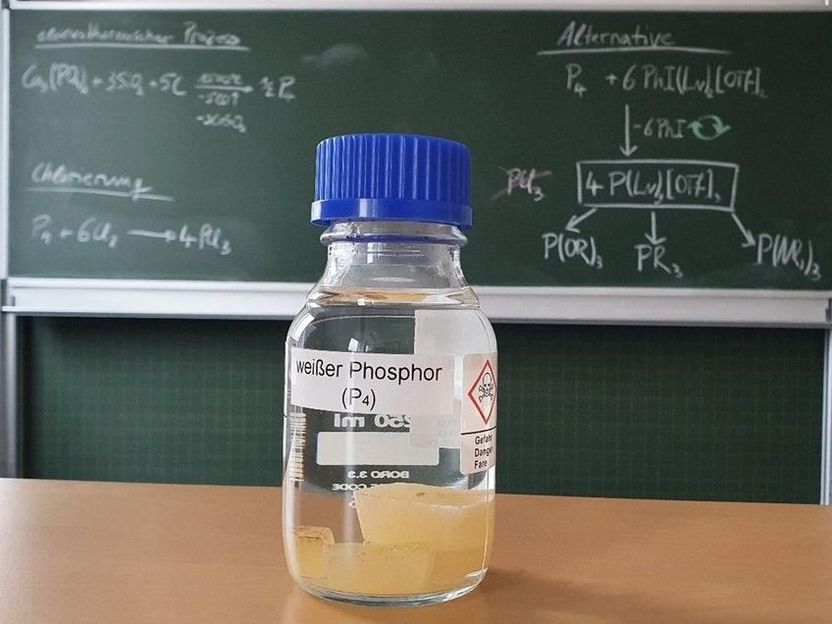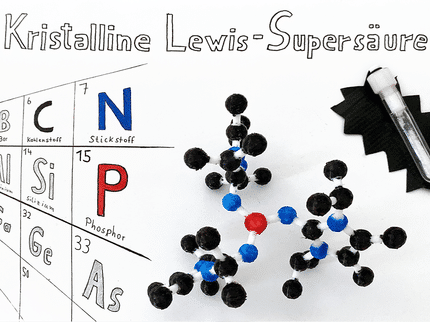Alternative process for converting white phosphorus promises more sustainability in the chemical industry
Groundbreaking results
Advertisement
Chemists at the Technische Universität Dresden have developed a new, more sustainable process for synthesizing numerous important everyday chemicals from white phosphorus. The new process has the potential to establish innovative, more resource-efficient processes in the chemical industry. The groundbreaking results, which are the product of more than a decade of intensive research, have now been published in the journal “Nature Chemistry”.

TUD chemists have succeeded in specifically converting white phosphorus (P4) into an alternative and much less problematic P intermediate reagent.
© K. Schwedtmann, T. Schneider
The chemical element phosphorus (P) is one of the essential building blocks of all biological life and, based on it, a function-giving component of many products: in medicines, food products or fertilizers. In nature, phosphorus occurs exclusively in bound form as phosphate in the earth's crust. However, continental deposits are finite and are estimated to last for only a few more decades.
For industrial use, phosphates are converted into the so-called white phosphorus by laborious chemical processes. Alongside red, black and violet phosphorus, white phosphorus is the most important modification of the element in industrial terms and, to date, is still an irreplaceable starting point for the production of many pharmaceuticals, flame retardants, battery electrolytes, herbicides and other phosphorus fine chemicals.
For the production of phosphorus-containing everyday chemicals, the white phosphorus is mostly converted by chlorination with chlorine gas to phosphorus trichloride (PCl3); a corrosive and toxic liquid, which is of central importance for the chemical industry as a large-scale industrial intermediate. However, the production and use of PCl3, which has so far been without alternative, is highly problematic.
The chemist Prof. Jan J. Weigand of the TU Dresden and his team have now succeeded in specifically converting white phosphorus (P4) into an alternative and much less problematic phosphorus intermediate reagent. In this process, the use of chlorine gas can be completely omitted. Instead, the process chemicals needed to convert the white phosphorus are recyclable.
"Economic factors still stand in the way of industrial application of the process, however a rethink is currently taking place here due to necessary, more sustainable aspects in the chemical industry. The more resource-conserving and efficient use of finite raw materials and the development of sustainable processes in many areas of chemistry are of the utmost importance. This work is a decisive breakthrough in phosphorus chemistry and of great importance for the further development of more sustainable and environmentally friendly processes," affirms Dr. Kai Schwedtmann, one of the two first authors of the publication.
Prof. Weigand and his group are currently developing further concepts with the aim of completely eliminating the need to use white phosphorus or PCl3 for the synthesis of pharmaceuticals, flame retardants, battery electrolytes, herbicides and other phosphorus fine chemicals: “In order to meet the greatest challenges of our time, a rethink must also take place in the chemical industry. We want to make a small contribution to this with our research by developing a "blueprint" for a more modern and more sustainable phosphorus chemistry.”
Original publication
Other news from the department science
Most read news
More news from our other portals
See the theme worlds for related content
Topic world Synthesis
Chemical synthesis is at the heart of modern chemistry and enables the targeted production of molecules with specific properties. By combining starting materials in defined reaction conditions, chemists can create a wide range of compounds, from simple molecules to complex active ingredients.

Topic world Synthesis
Chemical synthesis is at the heart of modern chemistry and enables the targeted production of molecules with specific properties. By combining starting materials in defined reaction conditions, chemists can create a wide range of compounds, from simple molecules to complex active ingredients.



























































